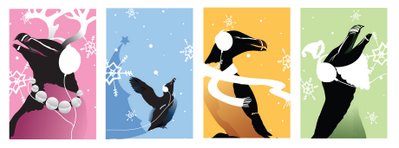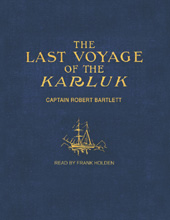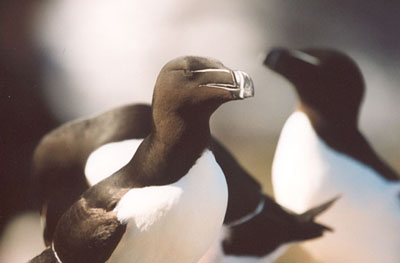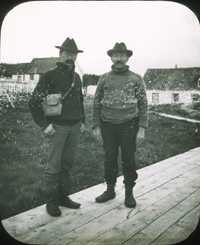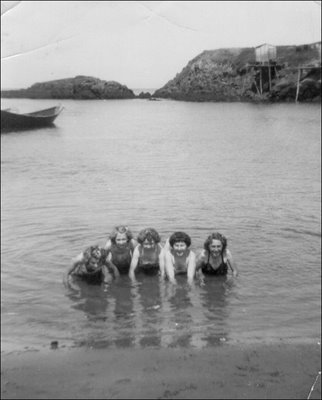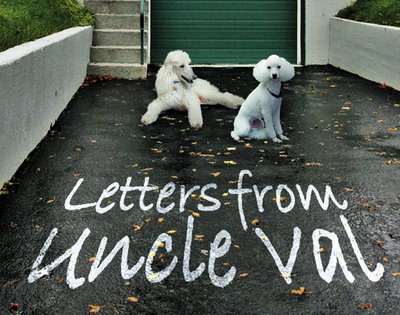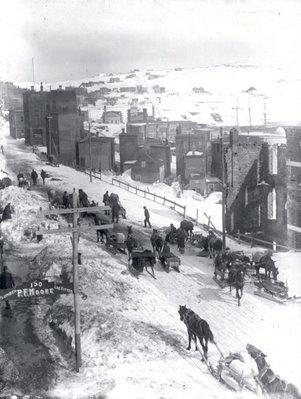
It's the sixth night. Cold and calm here in Tors Cove after a day of feasting with good company and skating by the sea. And now an evening Christmas story from David Weale.
Fluffy Jesus
The night of the Christmas concert arrived at last. As I walked along the dark, snowy road with my family I could see the school in the distance, shining like an eye on the top of Greenmount Hill, and it seemed a grand novelty to be going there at night with my mother and father and little sister. Indeed, because of my enthralled state of mind almost everything that happened during those approaching hours seemed uncommonly delightful, and I had the strong urge to compliment everyone and everything I encountered. A bird landing on a branch, or flying away, or the sun slipping behind a cloud or appearing suddenly, all were revelations and signs of the great and billowing goodness of everything.
That year I was to play the part of a doctor in one of the sketches, and was carrying a pair of glasses made out of wire, and a top hat and valise fashioned out of cardboard and darkened with stove black. My father had made them for me that very afternoon and I was expecting to carry them home with me when the concert was over. I had no way of knowing that a surprising turn of events would make that impossible, and if I had guessed for a year, or a lifetime, I could not have predicted what that turn of events was going to be. There were no stars out to guide our journey, but somewhere behind the clouds they were lining up portentously.
The school that night was a magical place, like something just touched by the end of a wand. And I was that wand. The nickering of horses, the glad ringing of sleigh bells, the shouts of greeting -- how splendorous and complete it all was! Each stepping horse seemed a darling creature, and the sight of each man and woman, boy and girl, a cause for rejoicing. The school itself was bursting with light from the gas lanterns brought from homes and hung along the walls, and in the yard fat, falling snowflakes, in slow descent, were being picked out of the darkness by the window brightness.
Inside was a small, improvised stage, built that week by some of the fathers, on which had been set an asthmatic pump organ, lugged to the school on a wood sleigh for the night’s entertainment. There were two white sheets, strung across the front on a piece of number nine wire, with a big, self-conscious boy at either end for opening and closing, and crepe streamers hung diagonally across the room, with a large, red, accordion bell at the centre that sank down slowly as the school warmed, and rose back up as it cooled. Or was it the other way around?
It was a full house, with the young men of the community standing side by side in a bachelor pack, leaning along the back wall. I presumed they had come for the concert, but now understand they had gathered, not to be entertained by callow youngsters, but to be in the same room with the eligible, Christmas virgins of the community. They had lines of their own to deliver that night, and were watching for an opportunity.
Strangely, I can’t remember anything of my own performance, but I do recall the little brown bags of homemade fudge that cost ten cents; the Christmas apples; the large yellow and red barley candies, shaped like animals, that would linger in your mouth for hours; and the little, wooden pencil-box, with the sliding top that I received from the teacher. One other year I received from her a small number of pencils, with my very own name, DAVID WEALE, emblazoned on the side in gold letters, which seemed to me at the time one of the most amazing things I had ever seen. The teacher, I reasoned, must have had some very powerful connections to be able to get specially stamped pencils for every child in the school. In that porridge and potatoes world of hard-scrabble subsistence, when some people were still dropping pennies into the collection plate, and frugality was a virtue that ranked right up there with faith, hope and charity, it didn’t take a very great present to fill a child’s heart with delight. It’s why that Christmas for me was so spectacular. I was joyous as a carol with my pencil-box in one hand, a royal, red apple in the other, and my cheek bulging with a barley shape, and had no idea the best, by far, was yet to come.
As the concert drew to a close the intensity heightened as every child in the school waited for the heavy THUMP! THUMP! THUMP! on the school door. “ He’s here, he’s here,” we all would cry out, and with that Santa would step through the door, from the outside to the inside, and from his world to ours. I think I understood at the time that he wasn’t in the same league as God, but there was no doubt in my mind that he was supernatural, with great and incomprehensible powers. He also showed up. The heavenly father was a distant figure who was often talked about but never seen, whereas Santa arrived every year, on schedule, at the door of the Greenmount schoolhouse -- with treats. Eventually we were all informed that he wasn’t real, and that we were too big to go on believing, but that was just another adult ploy to remove us from childhood and direct us into their world of reference. I’ve since discovered that adults, even the smartest ones, don’t actually know what is real. Most of them imagine that they do, but it’s precisely what they’ve forgotten. They talk all the time about truth, but don’t seem to realize it’s just their replacement for the Santa story.
Appearance wise, the Greenmount Santa was not at all like the stylish, perfectly turned out, mall-Santa of today, with his red suit, immaculate white trim, and designer boots. The Santa I remember was more earthy than that -- a peasant -- wearing a large, scruffy racoon coat, upon which the moths had obviously feasted, with a string of sleigh bells around his waist, held in place by a coarse length of binder twine. He also had a stocking cap pulled down over his ears that helped hold in place his absurd shag of a beard that looked like it had come off the sheep’s back just that morning. The only thing new or shiny about him were his calf-high, black rubber boots that had never seen the barn or the potato cellar, and doubtless had been purchased especially for the occasion. And there was no red whatsoever, save for the red of his nose. He looked, in a word, like a slight variant of any one of the old men who could be sighted in the barnyard of almost any farm in Greenmount. But it didn’t matter. Neither the high drama of his arrival, nor the grand effulgence of his presence, was diminished a whit by his rustic, rag-tag appearance.
It was alleged that one year, before my time, Santa entered and passed right out from the heat in the school, and, I suspect, from the Christmas moonshine he had been sampling to ratchet up his courage. I’m glad I didn’t witness that as I don’t know how the sight of a supine Santa might have affected my very great reverence for a figure who was, in my mind, as invincible as he was good.
The year of the supernatural surprise we all noticed immediately that when Santa arrived he was carrying not one, but two bags over his shoulder. That was different, and promising. Then, as he made his way through the crowd toward the tree we all observed, with almost hysterical glee, that one of the bags was wriggling with some form of concealed life. There was definitely something alive in Santa’s sack, and as the silent guessing spread across the room in a wave, he arrived at the front, held the mysterious, moving bag out in front of him, and announced, “Ho! Ho! Ho! I’ve got a present here for you here, but you’ll have to catch it.” And with that he dumped out onto the floor a little toffee-brown puppy, with long fur and three white feet.
It was a birth.
A portal from the other world had opened right before our eyes, and when that little, blinking creature came sliding out of Santa’s sack it was as though joy itself, on padded feet, had been delivered miraculously into our midst. The frightened puppy began immediately to run through the crowd and, incredibly, headed straight in my direction, attracted doubtless by the powerful magnetism of my heart’s desire. For a moment I was certain I was to be the lucky child, but just then a farmer, Marshall Rayner, stooped over and grabbed that little, headed-straight-for-me puppy in his thick, sausage fingers.
The night shattered, like a dropped dish. How was it possible to be so close to something so perfect and have it snatched away in the blink of an eye. I looked over at my father for some kind of comfort, or understanding, but he was laughing along with all the others. It was terrible, but just before the big tears began to roll I heard Marshall say, “David, do you have a dog at your place?”
“Noooo,” I stammered.
“Then here’s something for you.” he said, as he placed the puppy in my outstretched hands. Immediately, the night flew back together again, like a movie played in reverse.
The room didn’t suddenly go quiet, and I believe a choir of homespun angels was probably singling hallelujahs somewhere on the side of Greenmount hill, but there was a very great hush came over me as I stood silently, in speechless awe. I suppose I could say I was grateful, or surprised, or pleased, but the great and weightless wonder of the moment left no room for any of those lesser emotions. The Almighty had done it again; become flesh and bones and a hank of hair -- not in a cattle shed, but in our crude little schoolhouse, and walking home that night in the snow, with that puppy cradled in my arms, with me looking down at him, and him up at me, I had some inkling of what the Virgin Mary must have experienced. She could not have felt more blessed.
For obvious reasons I wanted to call him Jesus, but that wasn’t very well received by my parents. My mother said she didn’t want to hear me out in the yard calling, “Here Jesus. Here Jesus,” or saying, “Jesus, get off that couch.” Said it wouldn’t be right. So I called him Fluffy, and thereafter he became my constant companion and bounding co-adventurer. But though I never told anyone, at least not until now, in my own mind he was, and continues to be, Fluffy Jesus.
**************
David Weale is also the author of our favorite Christmas story The True Meaning of Crumbfest. The unabridged Earphones Award winning audio edition of which is available from Rattling Books (print edition available from Acorn Press).




